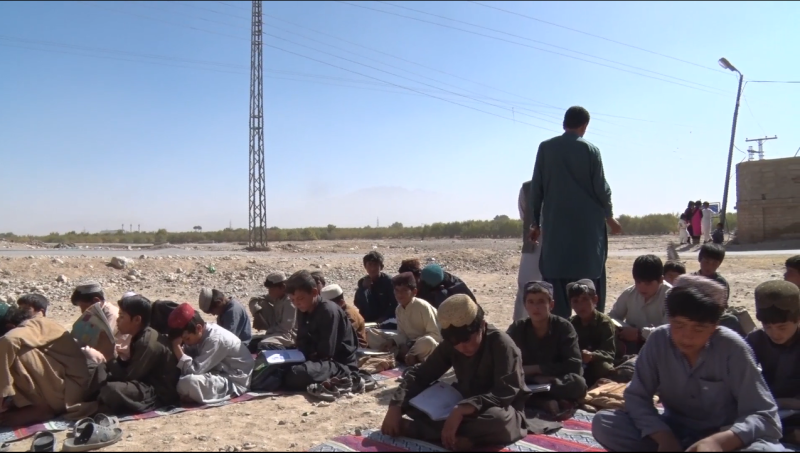
Government Primary School in Akhtarabad, situated in the outskirts of Quetta, is deprived of all basic necessities. Due to lack of chairs and furniture, students are forced to sit on the floor, while the school also has no boundary wall.
Moreover, threatening messages are also written on the broken walls of the schools.
This school was established in 1990s and 45 students are currently enrolled here, which is half of the number compared to 3 years ago. The school is also being run by 2 teachers, who claim that they have not received any sort of financial assistance from the government for past few years.
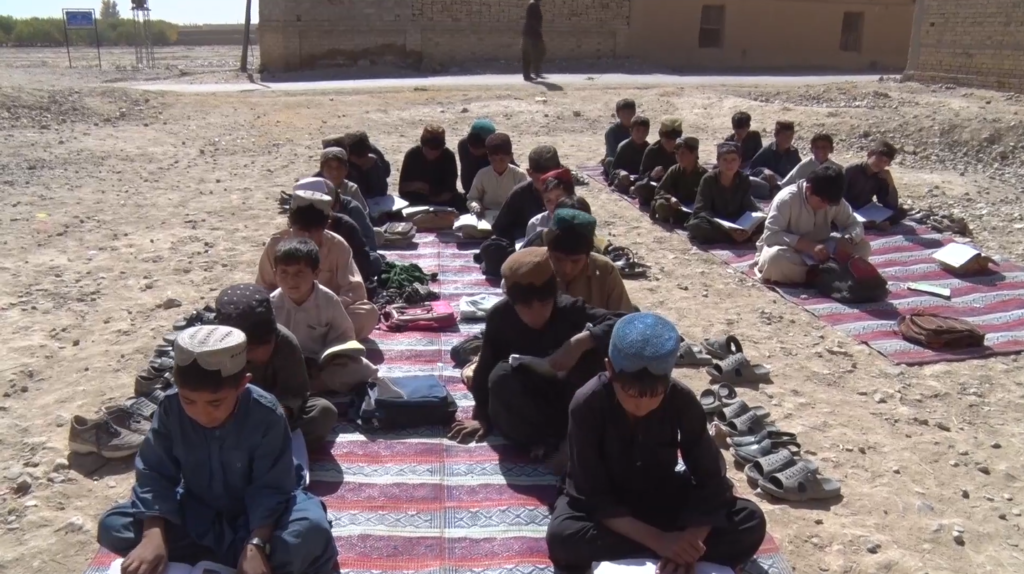
“Though government had sectioned 0.24 Million rupees for school expenses annually, these funds are not provided in last many years,” one of the school teachers told.
Balochistan, though the largest province area-wise and the richest in resources, is the poorest and the most backward province in all aspects, particularly in the educational field and is still being ignored.
According to the Annual report of Academy of Educational Planning and Management (AEPAM), an organization of federal ministry of education, titled ‘Pakistan Education Statistics 2016-17’, at least 70% of children, between the ages of five and 16, in Balochistan don’t go to school.
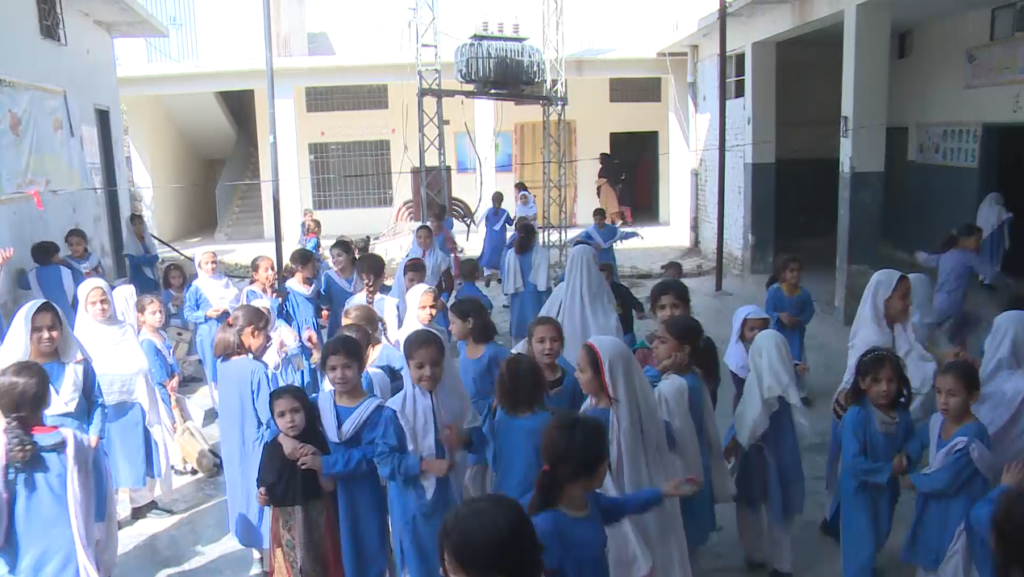
Statistically, more than 1.9 million children, including 927,542 male and 984,128 female, are out of school in Balochistan.
In comparison, 57% in FATA are out of schools, followed by 52% in Sindh and 40% in Punjab. KPK has the minimum percentage of out of school children with 34%. The ratio of out of school children in the country is 44%.
One of the major reasons behind these out of schools children is lack of safe education in the province. Government schools in Balochistan are not only facing security threats from militants and extremists, but poor infrastructure is also posing life threat to children.
The education budget of Balochistan has substantially increased since the passage of the 7th NFC Award. Between financial years 2010- 11 and 2017-18, the total education budget of Balochistan tripled from 19.4 billion rupees to 55.3 billion rupees.
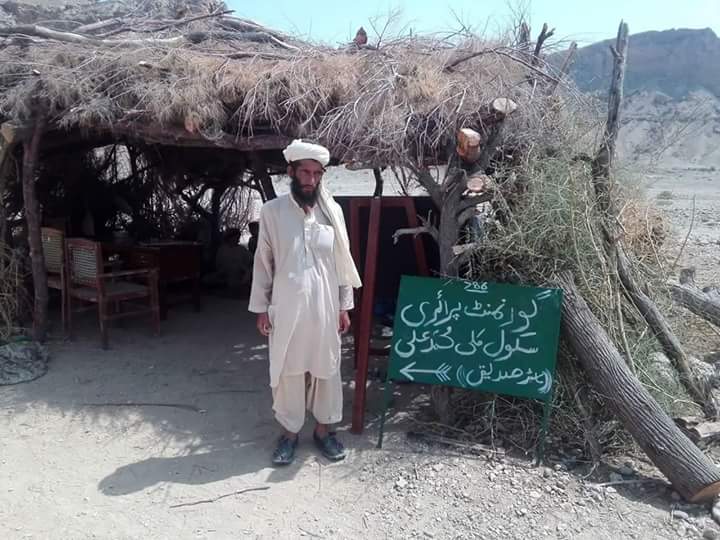
The percentage share of education in the total budget of Balochistan increased from 14% in 2012-13 to 18% in 2013-14, indicating the commitment of the new nationalists-led government to improve the state of education in the province. The percentage share of education continued to increase over the following two years, reaching 20% in 2015-16.
Balochistan government had allocated 48 billion rupees for development of education between 2013-14 and 2017-18 compared to 12 billion rupees between 2008-09 and 2012-13.
“A total of 56 billion rupees are allocated for education sector in 2018-19 Annual Budget of Balochistan including 43.9 billion rupees for schools and 8.5 billion for higher education”, Secretary Education Noor-ul-Haq Baloch told. Major share of the budget which is around 47 billion rupees is to be spent on non-development sector. On the other hand, 9 billion rupees are allocated for development projects.
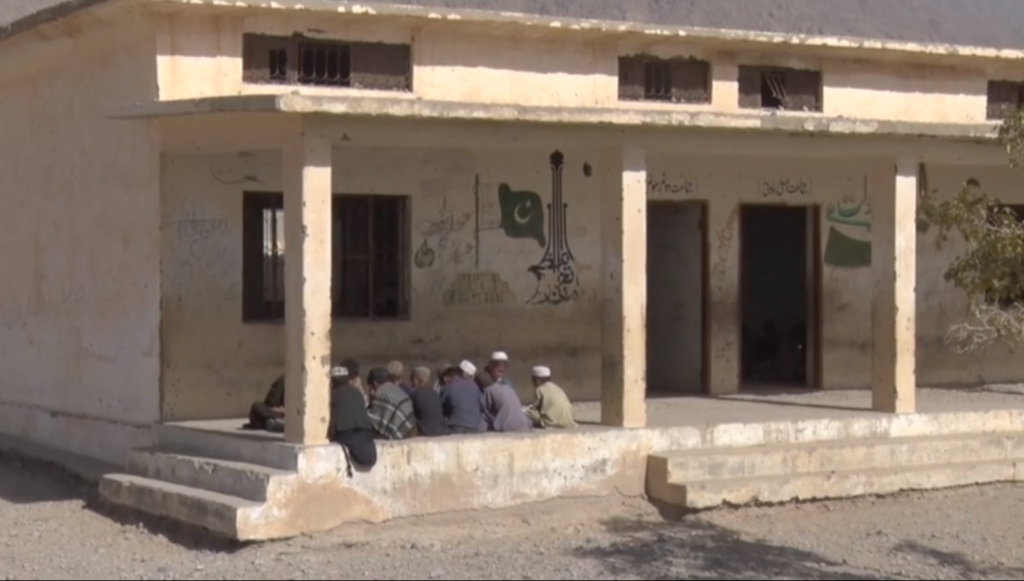
Balochistan has spent over 85% of the total budget allocated for education every year since 2013. However, a significant portion of the development budget for education remained unutilized every year. Of the approximately PKR 38 billion allocated to education in annual development budgets between the years 2013-14 and 2016-17, over PKR 11 billion (30%) could not be utilized. The share of unspent budget was the largest in 2013-14 when about half of the allocated budget couldn’t be spent.
In 2014-15, Balochistan government allocated 40.7 billion rupees for education sector, including 29 billion rupees for non-development and 11.7 or development purposes. Similarly, 48 billion rupees for allocated in 2015-16 annual budget where 38 and 10 billion rupees were allocated for non-development and development sector respectively.
In 2016-17, the provincial government allocated the same amount for education sector but this time increased the non-development fund to 42 billion rupees and decreased significant amount in development fund by allocating only 6.3 billion rupees. Later in 2017-18, Government of Balochistan allocated 55 billion rupees for education including 45.8 billion for non-development and 9.5 billion for development projects.
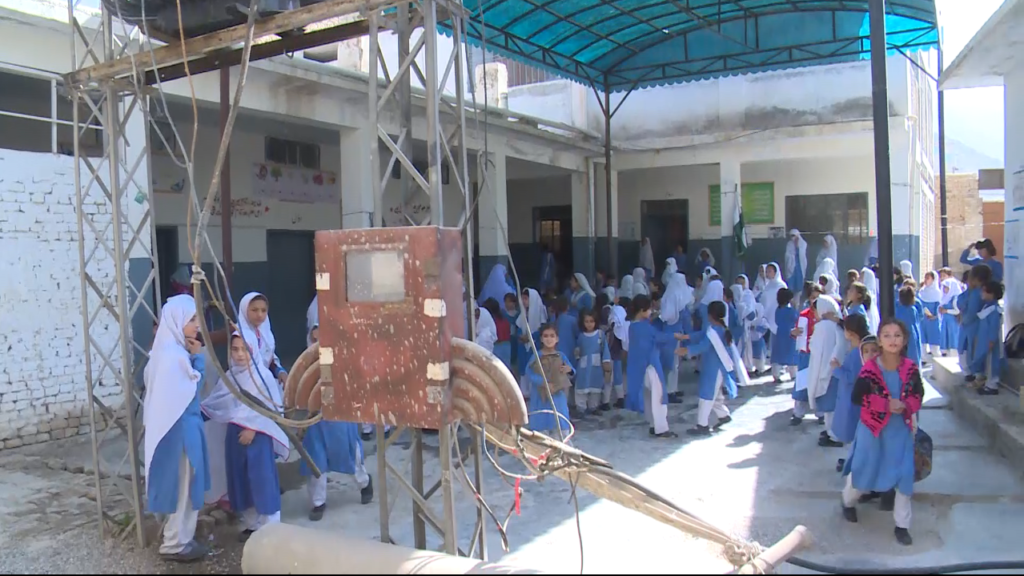
Although Balochistan Government has allocated 25% of total budget for education in last 5 years, which consist of 200 billion rupees, including 155 billion rupees for non-development funds (salaries of employees) and 45 billion for development projects in province, still more than 7 thousand schools across the province are shelter less out of 11627 total schools. These schools consist of rooms which have no roof over them. Most of these are single room schools with just one teacher.
“Students are at the mercy of weather changes and climate hazards. About 6700 school need rehabilitation. 2500 buildings of schools are considered dangerous”, an education department officer told as he asked to remain anonymous.
For instance, the building of Government Girls Primary School Fatah Bagh in Quetta is a symbol of fear for the students. A rented building which is tumbling is home to over 300 students. These girls are studying under destroyed roofs, temporary class rooms (having no electricity, gas) and under open sky in winter or summer.
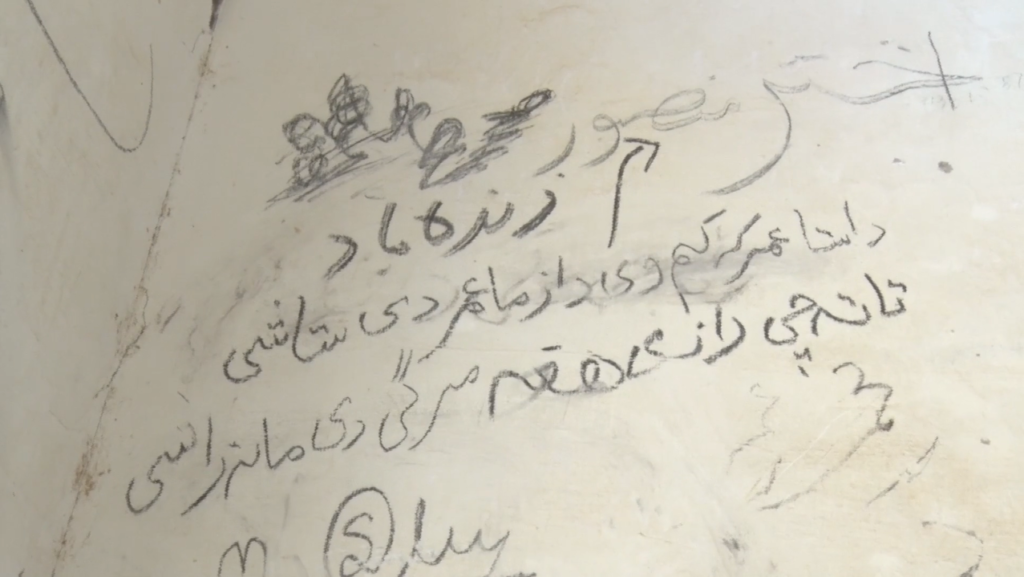
The school was built in 1988, and is being run on rent. The building has always been in miserable condition from the past and now with rainfall or snowfall it poses serious threats to the students as there are fears that the roof of the class room could collapsed any day.
It’s not only the damaged buildings which is causing insecurities among students, lack of government interest is another major cause of concern.
The Government Girls Middle School in Pashtoonabad poses huge danger to more than 200 girls studying in the school. It’s not the building but an electricity transformer which is installed within the school. Wires of the transformer lay on floor and many incidents of fire eruption have been reported.
"Several requests have been made to the Department of WASA and WAPDA to remove this transformer and place it in another area, but they have paid no heed. Wires of the transformer lay on floor everywhere, sometimes we find students sitting on them, as it is very difficult for the avoid these wires all the time. In case of rain, electricity current transfers into the earth and it forces us to close school", principal of the school said. “Parents are also reluctant to send their daughters to the schools. It is a matter of concern and government needs to take measures so that incidents could be avoided”, she added.
On inquiry, Spokesperson of Quetta Electric supply Company (QESCO) Afzal Baloch told that shifting a transformer to another suitable spot can be time consuming. “Replacement of Transformer to another place will be carried after the survey as quickly as possible”, he added.
Many bureaucrats and education officers in Balochistan are under trial under corruption charges in Accountability court. Currently Ex-Director Education Qayyom Babayi and Deputy Director Education Nizzam Uddin Mengal are in custody of NAB Balochistan with charges of corruption and illegal appointments of teachers on mass level.
Both officers were arrested at the beginning of 2016 under charges of corruption over illegal recruitments of teachers. Many other DEOs (district education officers) are also facing similar charges in Accountability court, which shows how corruption is one of the core causes behind the downfall of education in province.
"This school is running without boundary walls, door, desk and all other basic necessities. I have complained about the lack of all such facilities but nothing has happen as government is not taking any initiative," One of the teachers of the Akhtarabad school said.
He further said that still their main worry is that inhabitants of the area have been threatening them with these wall-chalking and demanding to close these schools. Therefore he is compelled to carry a gun with him every day when he comes here and keeps it inside the desk during school time. These threating messages come from local residents who believe receiving education is a sin.
On the other hand, local police says that they are yet to receive any complaint. “Action would be taken against such inhabitants if complaint is lodged”, police said.
“This primary school is not the only organization to face such circumstances. Many other schools in Balochistan are non-functional or practically shut down due to threats or being seized by tribal leaders or land grabbers”, an officer of education department told the author on promise of anonymity.
“We face so many difficulties and don’t have any facility here. We feel insecure all the time as there is no one to safeguard us”, student of class 4 Mohib Khan said.
Another student, Hameed Ullah said “Desks are not available in the school, not even blackboards, washrooms or gas heaters are provided”.
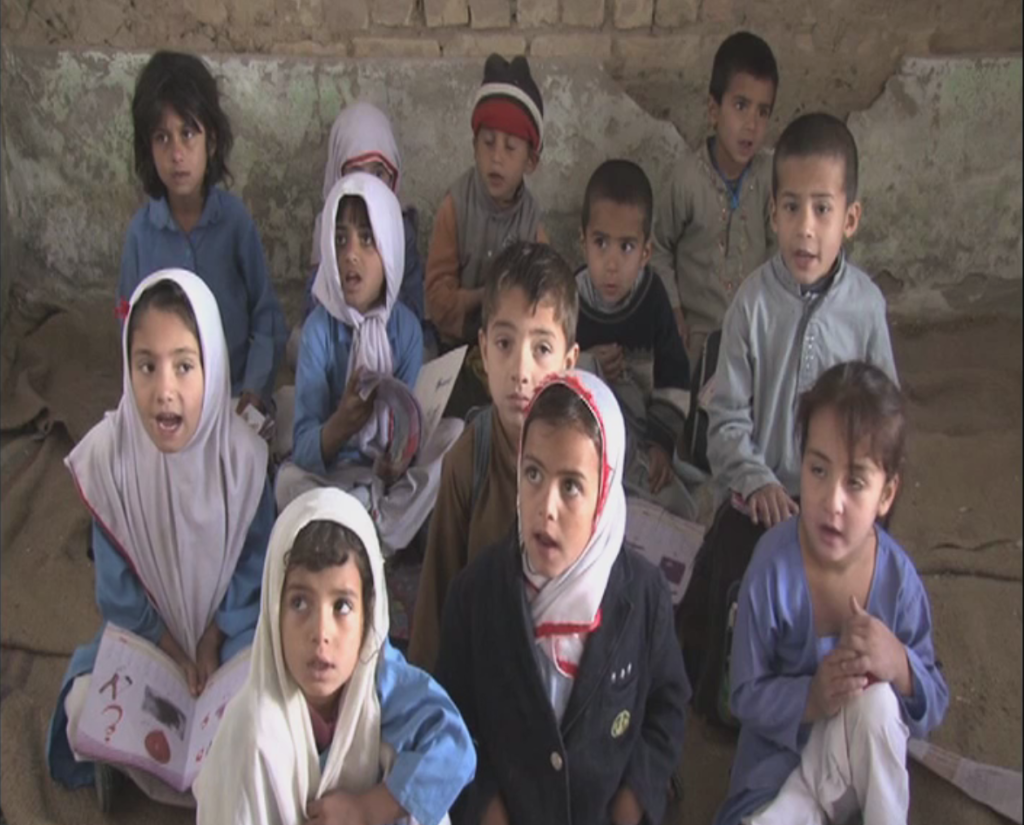
In Balochistan, 1835 schools are without any building which is more than 15% of total schools in province.
According to the Balochistan Education report of 2017, 229,960 girls are enrolled in government schools including 165,869 girls in primary schools, 44,076 in middle and 20,015 in high schools.
In 2013, 303,549 girls were enrolled in schools, 308,248 in 2014, 284,159 in 2015 and 236,889 in 2016. This shows a drastic decrease in numbers of girls’ enrollment in schools in last 5 years.
There is a massive imbalance between the provision of primary and post primary schools across the province. Over 80% of all government schools are at the primary level only, with enrolment in government girls high schools as low as in the hundreds in some districts.
On the other hand, Balochistan government is convinced that itis taking all the possible measures to provide quality education with safe environment.
“We have imposed educational emergency in Balochistan which shows our positive intent towards the education sector. Better results will be visible in education sector with effective reforms”, Chief Minister Jam Kamal said while chairing a meeting on educational development.
He further said that Balochistan has been utilizing all resources to improve literacy rate and education standards.
Asim Ahmed Khan is a Quetta based journalist and former reporter of Dawn, who tweets at @AsimKhanjourno. The attached images in this article have been submitted by the author himself.
Moreover, threatening messages are also written on the broken walls of the schools.
This school was established in 1990s and 45 students are currently enrolled here, which is half of the number compared to 3 years ago. The school is also being run by 2 teachers, who claim that they have not received any sort of financial assistance from the government for past few years.

“Though government had sectioned 0.24 Million rupees for school expenses annually, these funds are not provided in last many years,” one of the school teachers told.
Balochistan, though the largest province area-wise and the richest in resources, is the poorest and the most backward province in all aspects, particularly in the educational field and is still being ignored.
According to the Annual report of Academy of Educational Planning and Management (AEPAM), an organization of federal ministry of education, titled ‘Pakistan Education Statistics 2016-17’, at least 70% of children, between the ages of five and 16, in Balochistan don’t go to school.

Statistically, more than 1.9 million children, including 927,542 male and 984,128 female, are out of school in Balochistan.
In comparison, 57% in FATA are out of schools, followed by 52% in Sindh and 40% in Punjab. KPK has the minimum percentage of out of school children with 34%. The ratio of out of school children in the country is 44%.
One of the major reasons behind these out of schools children is lack of safe education in the province. Government schools in Balochistan are not only facing security threats from militants and extremists, but poor infrastructure is also posing life threat to children.
The education budget of Balochistan has substantially increased since the passage of the 7th NFC Award. Between financial years 2010- 11 and 2017-18, the total education budget of Balochistan tripled from 19.4 billion rupees to 55.3 billion rupees.

The percentage share of education in the total budget of Balochistan increased from 14% in 2012-13 to 18% in 2013-14, indicating the commitment of the new nationalists-led government to improve the state of education in the province. The percentage share of education continued to increase over the following two years, reaching 20% in 2015-16.
Balochistan government had allocated 48 billion rupees for development of education between 2013-14 and 2017-18 compared to 12 billion rupees between 2008-09 and 2012-13.
“A total of 56 billion rupees are allocated for education sector in 2018-19 Annual Budget of Balochistan including 43.9 billion rupees for schools and 8.5 billion for higher education”, Secretary Education Noor-ul-Haq Baloch told. Major share of the budget which is around 47 billion rupees is to be spent on non-development sector. On the other hand, 9 billion rupees are allocated for development projects.

Balochistan has spent over 85% of the total budget allocated for education every year since 2013. However, a significant portion of the development budget for education remained unutilized every year. Of the approximately PKR 38 billion allocated to education in annual development budgets between the years 2013-14 and 2016-17, over PKR 11 billion (30%) could not be utilized. The share of unspent budget was the largest in 2013-14 when about half of the allocated budget couldn’t be spent.
In 2014-15, Balochistan government allocated 40.7 billion rupees for education sector, including 29 billion rupees for non-development and 11.7 or development purposes. Similarly, 48 billion rupees for allocated in 2015-16 annual budget where 38 and 10 billion rupees were allocated for non-development and development sector respectively.
In 2016-17, the provincial government allocated the same amount for education sector but this time increased the non-development fund to 42 billion rupees and decreased significant amount in development fund by allocating only 6.3 billion rupees. Later in 2017-18, Government of Balochistan allocated 55 billion rupees for education including 45.8 billion for non-development and 9.5 billion for development projects.

Although Balochistan Government has allocated 25% of total budget for education in last 5 years, which consist of 200 billion rupees, including 155 billion rupees for non-development funds (salaries of employees) and 45 billion for development projects in province, still more than 7 thousand schools across the province are shelter less out of 11627 total schools. These schools consist of rooms which have no roof over them. Most of these are single room schools with just one teacher.
“Students are at the mercy of weather changes and climate hazards. About 6700 school need rehabilitation. 2500 buildings of schools are considered dangerous”, an education department officer told as he asked to remain anonymous.
For instance, the building of Government Girls Primary School Fatah Bagh in Quetta is a symbol of fear for the students. A rented building which is tumbling is home to over 300 students. These girls are studying under destroyed roofs, temporary class rooms (having no electricity, gas) and under open sky in winter or summer.

The school was built in 1988, and is being run on rent. The building has always been in miserable condition from the past and now with rainfall or snowfall it poses serious threats to the students as there are fears that the roof of the class room could collapsed any day.
It’s not only the damaged buildings which is causing insecurities among students, lack of government interest is another major cause of concern.
The Government Girls Middle School in Pashtoonabad poses huge danger to more than 200 girls studying in the school. It’s not the building but an electricity transformer which is installed within the school. Wires of the transformer lay on floor and many incidents of fire eruption have been reported.
"Several requests have been made to the Department of WASA and WAPDA to remove this transformer and place it in another area, but they have paid no heed. Wires of the transformer lay on floor everywhere, sometimes we find students sitting on them, as it is very difficult for the avoid these wires all the time. In case of rain, electricity current transfers into the earth and it forces us to close school", principal of the school said. “Parents are also reluctant to send their daughters to the schools. It is a matter of concern and government needs to take measures so that incidents could be avoided”, she added.
On inquiry, Spokesperson of Quetta Electric supply Company (QESCO) Afzal Baloch told that shifting a transformer to another suitable spot can be time consuming. “Replacement of Transformer to another place will be carried after the survey as quickly as possible”, he added.
Many bureaucrats and education officers in Balochistan are under trial under corruption charges in Accountability court. Currently Ex-Director Education Qayyom Babayi and Deputy Director Education Nizzam Uddin Mengal are in custody of NAB Balochistan with charges of corruption and illegal appointments of teachers on mass level.
Both officers were arrested at the beginning of 2016 under charges of corruption over illegal recruitments of teachers. Many other DEOs (district education officers) are also facing similar charges in Accountability court, which shows how corruption is one of the core causes behind the downfall of education in province.
"This school is running without boundary walls, door, desk and all other basic necessities. I have complained about the lack of all such facilities but nothing has happen as government is not taking any initiative," One of the teachers of the Akhtarabad school said.
He further said that still their main worry is that inhabitants of the area have been threatening them with these wall-chalking and demanding to close these schools. Therefore he is compelled to carry a gun with him every day when he comes here and keeps it inside the desk during school time. These threating messages come from local residents who believe receiving education is a sin.
On the other hand, local police says that they are yet to receive any complaint. “Action would be taken against such inhabitants if complaint is lodged”, police said.
“This primary school is not the only organization to face such circumstances. Many other schools in Balochistan are non-functional or practically shut down due to threats or being seized by tribal leaders or land grabbers”, an officer of education department told the author on promise of anonymity.
“We face so many difficulties and don’t have any facility here. We feel insecure all the time as there is no one to safeguard us”, student of class 4 Mohib Khan said.
Another student, Hameed Ullah said “Desks are not available in the school, not even blackboards, washrooms or gas heaters are provided”.

In Balochistan, 1835 schools are without any building which is more than 15% of total schools in province.
According to the Balochistan Education report of 2017, 229,960 girls are enrolled in government schools including 165,869 girls in primary schools, 44,076 in middle and 20,015 in high schools.
In 2013, 303,549 girls were enrolled in schools, 308,248 in 2014, 284,159 in 2015 and 236,889 in 2016. This shows a drastic decrease in numbers of girls’ enrollment in schools in last 5 years.
There is a massive imbalance between the provision of primary and post primary schools across the province. Over 80% of all government schools are at the primary level only, with enrolment in government girls high schools as low as in the hundreds in some districts.
On the other hand, Balochistan government is convinced that itis taking all the possible measures to provide quality education with safe environment.
“We have imposed educational emergency in Balochistan which shows our positive intent towards the education sector. Better results will be visible in education sector with effective reforms”, Chief Minister Jam Kamal said while chairing a meeting on educational development.
He further said that Balochistan has been utilizing all resources to improve literacy rate and education standards.
Asim Ahmed Khan is a Quetta based journalist and former reporter of Dawn, who tweets at @AsimKhanjourno. The attached images in this article have been submitted by the author himself.
